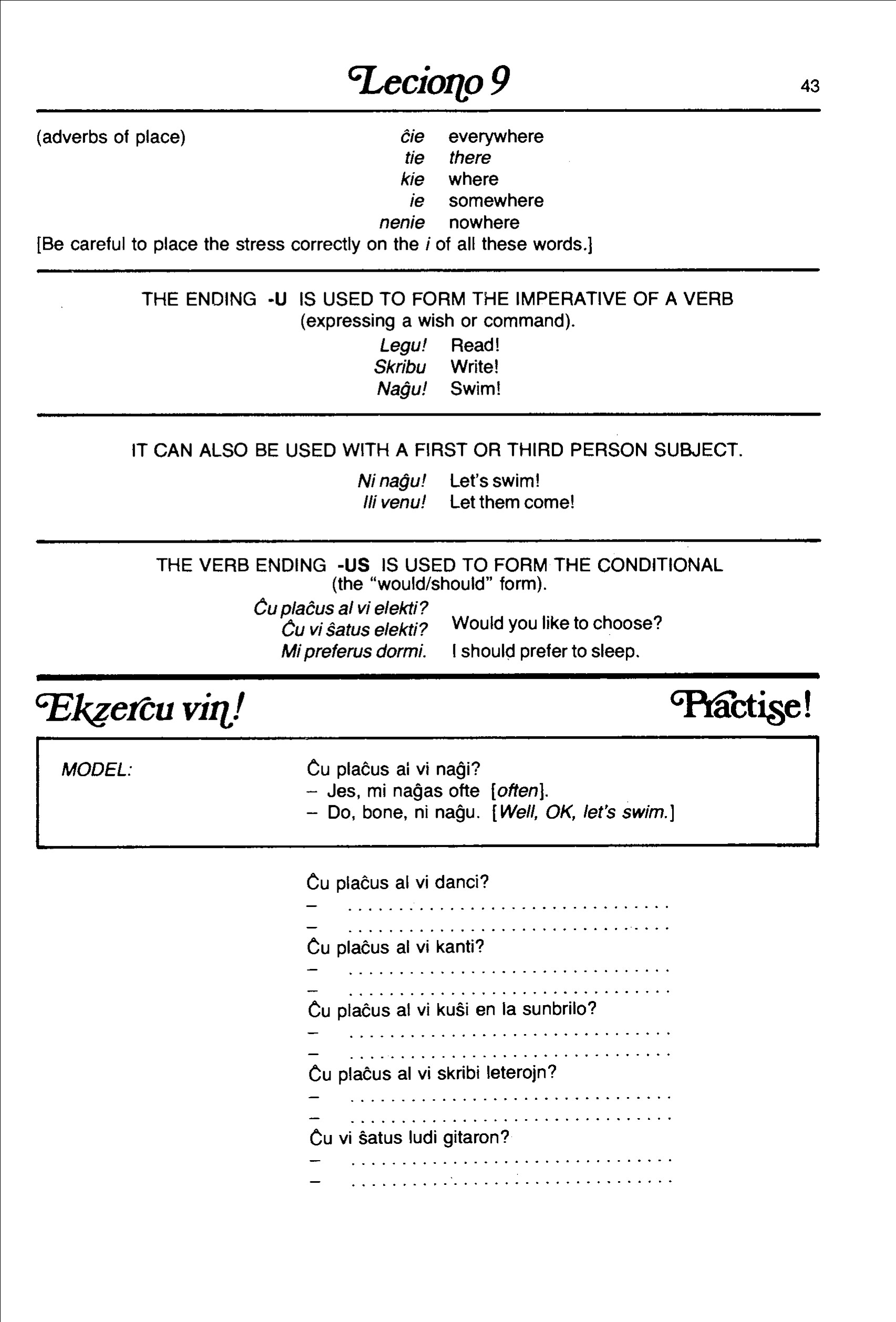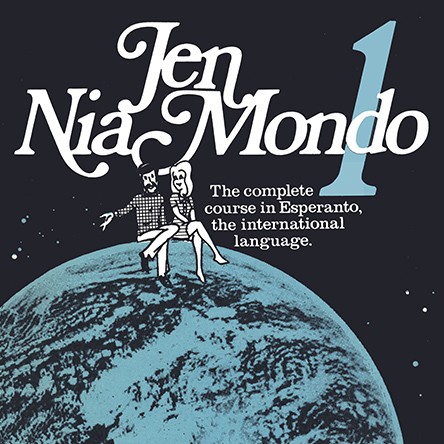
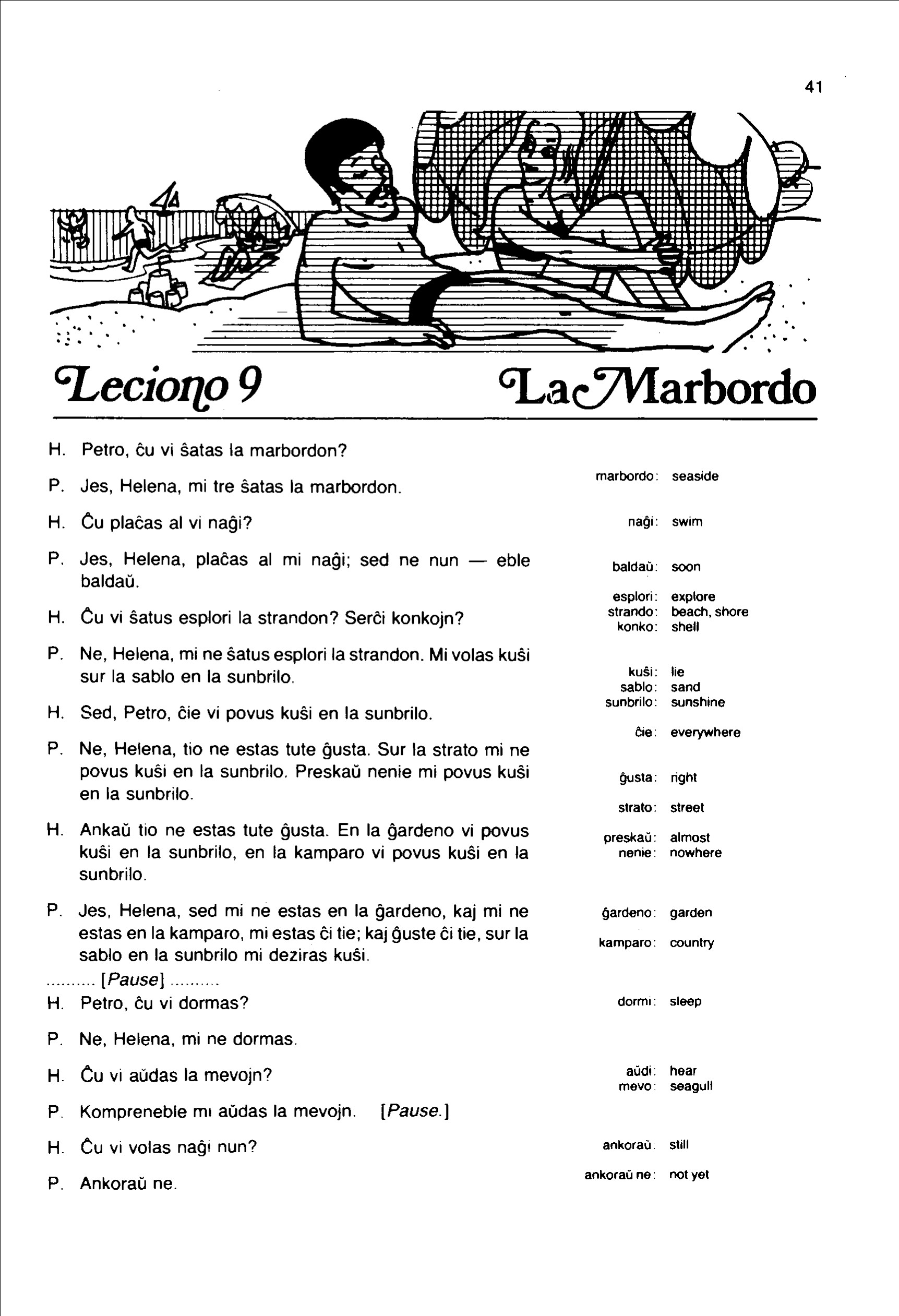
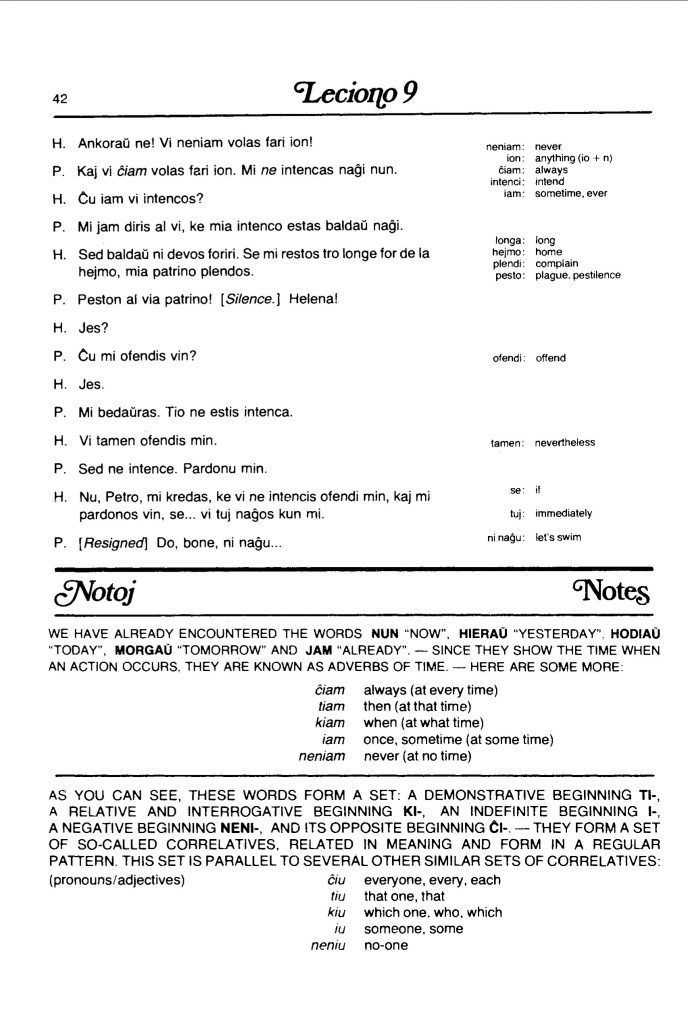
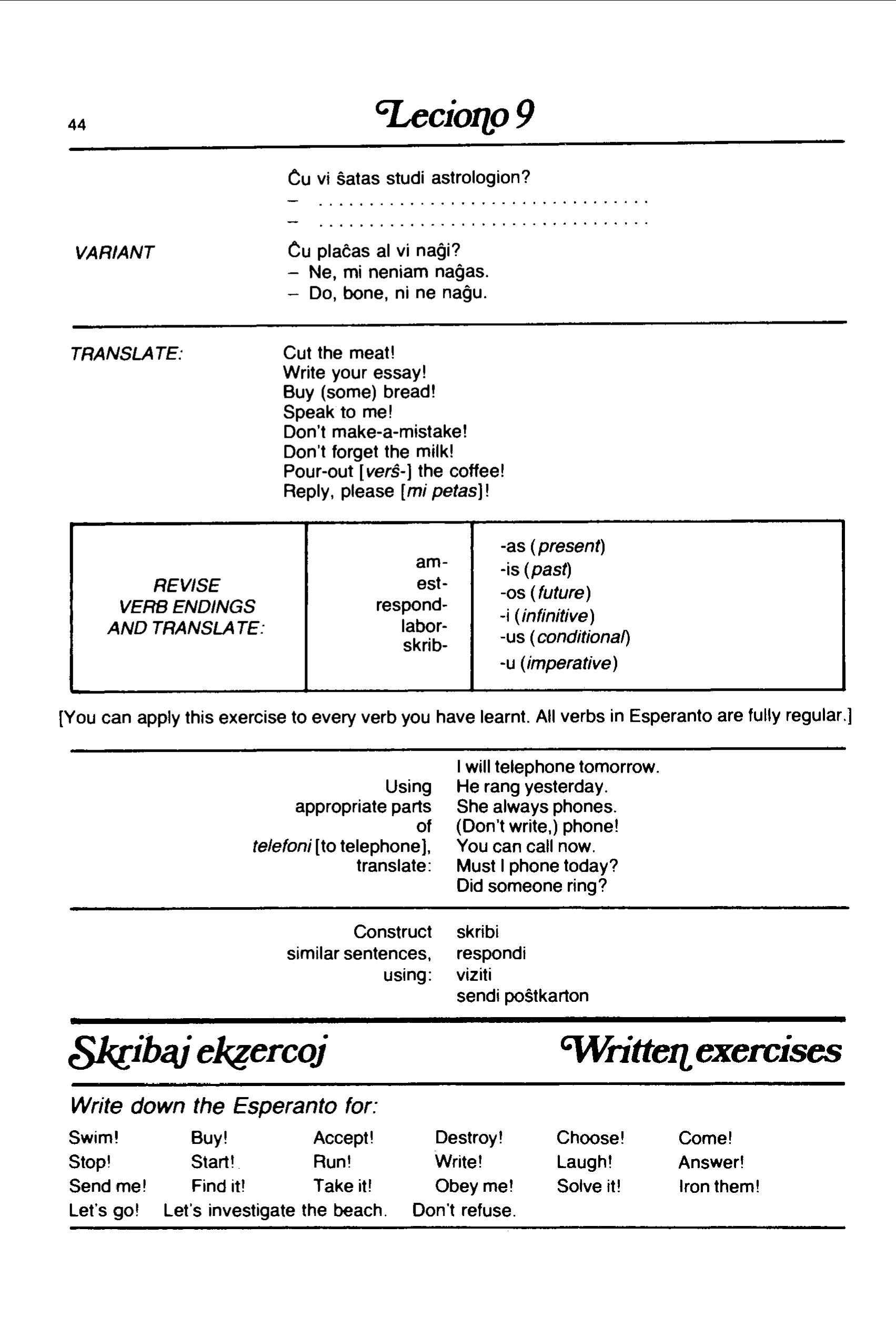
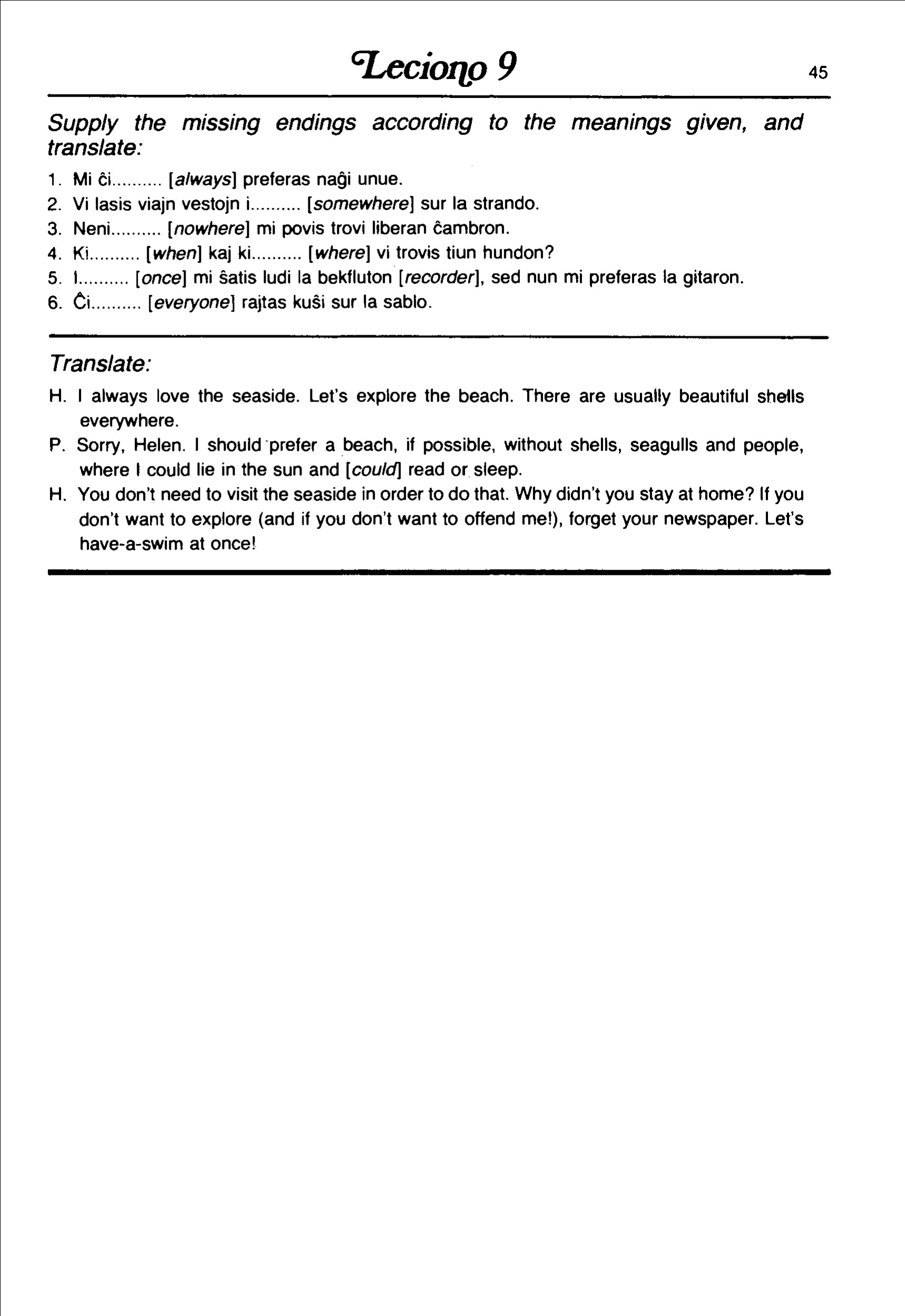

Sample Answers are offered below
On the Welcome page for this site there is a short essay called ‘How Esperanto works‘. At its end there is a statement about an aspect of learning Esperanto which gives some people difficulty.
Esperanto has a group of 45 inter-related words, which often give newcomers some bother as no other language has such a complete system, logically constructed.
The 45 words – often called correlatives, each complete in itself, never to be sub-divided – can be arranged as nine sets of five as in these lessons or five sets of nine.
A mnemonic for the five correlatives ending in ‘-am‘ is the abbreviation ‘a.m.’ which English uses to express ‘morning time’. The extended translations given them in the Notes above – ‘neniam‘ = at no time, etc. – can be very helpful.
Similarly the set of five correlatives ending in ‘-u‘ are each concerned with one individUal person or thing. The set of five correlatives ending in ‘-e‘ all relate to place and translate into English with words also ending in ‘-e‘, i.e. where, there etc. Come up with better mnemonics if you can!
Please attempt the exercises before consulting the material below.
Lesson 9 Answers
Page 43
Ekzercu vin! – Exercise yourself!
Ĉu plaĉus al vi danci? Jes, mi dancas ofte. Do, bone, ni danĉu nun! Would you like to dance (i.e. if you had the chance)? Yes, I (i.e. actually) dance / go dancing often. So, good, let’s dance now!
Ĉu plaĉus al vi kanti? Jes, mi kantas ofte. Do, bone, ni kantu tuj. Would you like to sing? Yes, I sing often. Good, let’s sing straightaway.
Ĉu plaĉus al vi kuŝi en la sunbrilo? Jes, mi kuŝas en la sunbrilo malofte. Do, bone, ni kuŝsu en la sunbrilo hodiaŭ. Would you like to lie in the sunshine? Yes, I lie in the sunshine infrequently. So, good, let’s do it now.
Ĉu plaĉus al vi skribi leterojn? Jes, mi skribas leterojn malofte. Do, bone, ni skribu kelkajn nun. Would you like to write letters? Yes, I write letters infrequently. Good, let’s write some now.
Ĉu vi ŝatus ludi gitaron? Jes, mi ludas gitaron bone. Do, ni ludi niajn gitarojn nun Would you love to play a guitar? Yes, I play a guitar well. Good, let’s play our guitars now.
Page 44
Ĉu vi ŝatas studi astrologion? Ne, mi malŝatas studi astrologion! Do, ni ne studu ĝin nun. Do you love studying astrology? No, I hate studying astrology. OK, let’s not study it now.
Tranĉu la viandon! Cut the meat!
Skribu vian eseon! Write your essay!
Aĉetu panon! Buy (some) bread!
Parolu al mi! Speak to me!
Ne eraru! Don’t make a mistake!
Ne forgesu la lakton! Don’t forget the milk!
Verŝu la kafon! Pour out the coffee!
Respondu, mi petas! Reply, please!
Mi am-os vin morgaŭ I shall love tomorrow
Vi est-is mia bona amiko You were my good friend
Respond-u la telefonon, mi pet-as! Please answer the telephone!
Ili ne vol-us labor-i se la vetero est-us malbona. They would not be willing to work if the weather were bad.
Lia patrino povas tranĉ-i la panon bonege, His mother is able to cut the bread excellently.
Hieraŭ ŝi skrib-is ses leterojn al amikoj. She wrote six letters to friends yesterday.
Telefona ekzerco – Telephone exercise
Mi telefon-os morgaŭ – I will telephone tomorrow
Li telefon-is hieraŭ – He rang yesterday
Ŝi ĉiam telefon-as – She always phones
(Ne skribu,) Telefon-u! – (Don’t Write) phone!
Vi povas telefon-i nun – You can call now
Ĉu mi devas telefon-i hodiaŭ – Must I phone today?
Ĉu iu telefon-is – Did someone ring?
Ĉu vi skrib-is tiun leteron ankoraŭ? Ne, vi mem skrib-u ĝin nun. Mi ne povas skrib-i ĝin. Se mi skrib-us ĝin, ĉu vi est-us kontenta. Jes, mi est-us tre kontenta. Bone, mi skribos ĝin. Have you written that letter yet? No, you write it now yourself! I can’t write it. If I wrote it, would you be content? Yes, I would be very content. Good, I shall write it.
Ĉu vi respond-is la telefonon? Ne, mi ne povis respond-i. Se mi respond-us nun, ĉu vi est-us kontenta?. Jes, tre kontenta. Do bone, mi respond-os! Did you answer the phone? No, I couldn’t (answer). If I answer now, would you be content? Yes, very content. OK, good, I will answer!
Mi vizit-os vin morgaŭ. Mia bona amiko, vi jam vizit-is min hieraŭ, tamen se vi volus vizit-i me denove {4} tio est-us bona. I shall visit you tomorrow. My good friend, you’ve already visited me yesterday, however if you wanted to visit me again, that would be good.
Send-u poŝtkarton al mi tuj! Mi send-is al vi kiam mi est-is for. Kaj se mi est-us for denove, mi certe send-us poŝtkarton al vi. Mia frato est-as en Francujo. Li intenc-as send-i poŝtkarton. Send me a postcard at once! I sent to you when I was in away. And i f I was away again, I certainly would send you a postcard, My brother is in France. He intends to send a postcard.
Skribaj Ekzercoj – Gramatiko kaj Vortaro
Naĝu! – swim! Aĉetu! – buy! Acceptu {8} – accept! Detruu! – destroy! Elektu! – choose! Venu! – come! Haltu! – stop Komencu! – start! Run! – run! Skribu! – write! Ridu! – laugh! Respondu! – answer! Sendu min! – send me! Trovu ĝin! – find it! Prenu ĝin! – take it! Obeu min! – obey me! Solvu ĝin – solve it! Gladu ilin! – iron them! Ni iru! – let’s go! Ni serĉu la strandon! – let’s investigate the beach! Ne rifuzu! – don’t refuse
1. Mi ĉiam preferas naĝi unue, I always prefer to swim first.
2. Vi lasis viajn vestojn ie sur la strando. You left your clothes on the beach.
3. Nenie mi povis trovi liberan ĉambron. Nowhere did I could find you a free room. I couldn’t find you a free room anywhere
4. Kiam kaj kie vi trovis tiun homon? Where did you find that dog?
5. Iam mi ŝatis ludi bekfluton sed nun mi preferas la gitaron. Once I loved playing the recorder but now I prefer the guitar.
6. Ĉiu rajtas kuŝi sur la strando. Everyone has the right to lie on the sand.
Traduku!
H. Mi ĉiam ŝatas la marbordon. Ni esploru la strandon. Estas kutime belaj konkoj ĉie.
P. Mi nedaŭras, Helena. Mi preferus strandon, se eble, sen konkoj, marbirdoj kaj homoj, kie mi povus kuŝi en la sunbrilo kja legus aŭ dormus.
H. Vi ne bezonas viziti la marbordon por fari tion. Kial vi ne restis hejme? Se vi ne volas esplori (kaj vi ne volas ofendi min!) forgesu vian gazeton. Ni naĝu tuj!
Lesson 9 Words to be added to your stock pile!
Aŭd/i
Baldaŭ
Ĉie
Ĉio
Elekt/i
Esplor/i
Hejm/o
Iam
Ie
Kampar/o
Konk/o
Kuŝ/i
Marbord/o
Mev/o
Naĝ/i
Hear cf audio
Soon cf bald
Everywhere
Each, everyone
Choose
Explore
Home
Ever, once
Somewhere
Country
Shell
Lie, recline
Seaside
Seagull
Swim
Neniam
Nenie
Ofend/i
Oft/a
Pest/o
Plend/i
Preskaŭ
Sabl/o
Strand/o
Strat/o
Sunbril/o
Tamen
Tiam
Tuj
Verŝ/i
Never
Nowhere
Offend
Frequent
Plague, pestilence
Complain
Almost
Sand
Beach, shore
Street
Sunshine
However
Then
At once, immediately
Pour (out)
